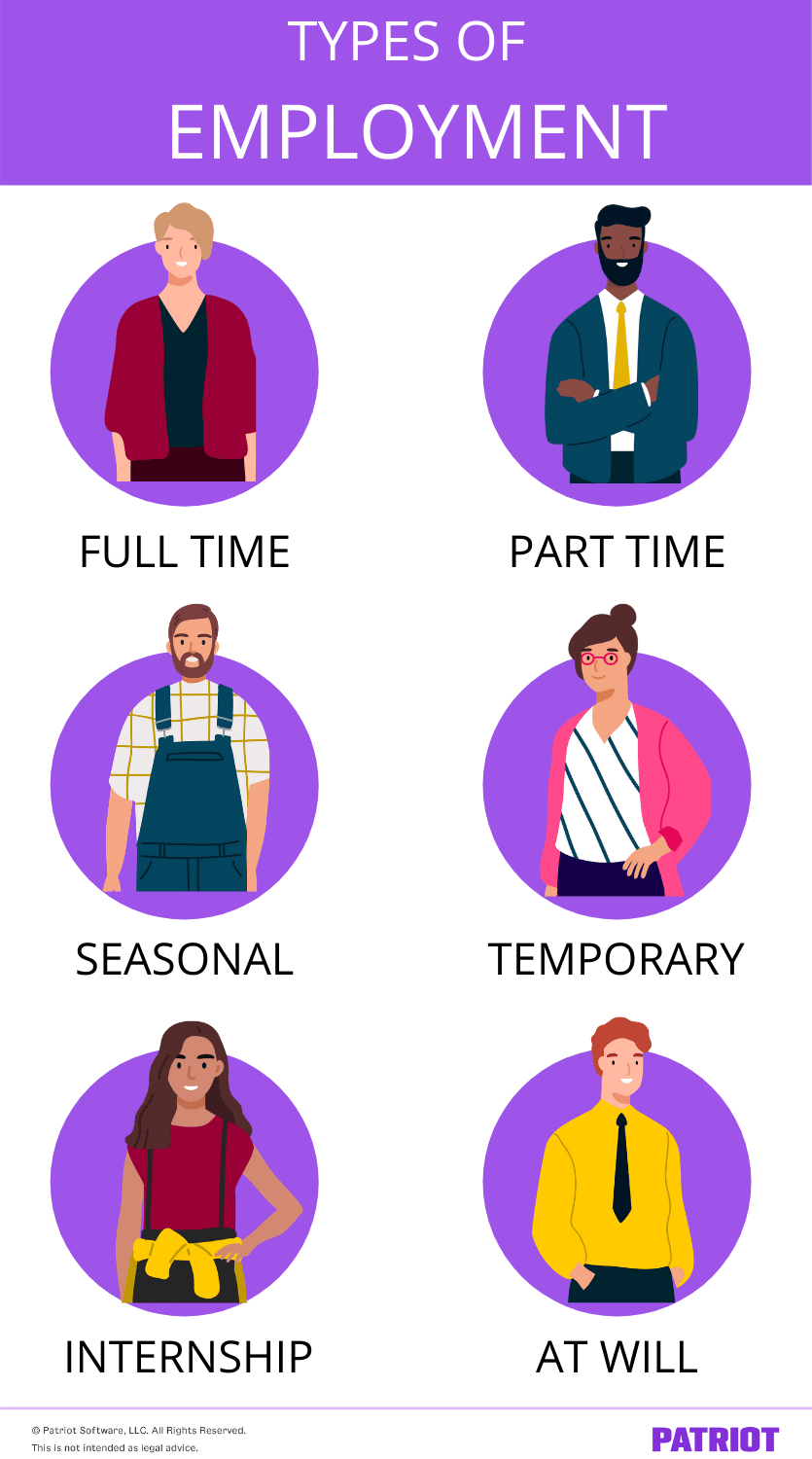Are you thinking about hiring an employee? First, you should hash out details about the job. Think about things like how many hours you’ll need the employee to work and what kind of commitment you’re willing to make. Familiarize yourself with different types of employment to pick the right job status.
Depending on your business and its needs, you might not always need to hire a full-time employee. Read on to learn about six types of employment.
6 Employment Types
There are a number of types of employment employers utilize at their businesses. Typically, the different types of employment status are broken up by:
- Number of hours per week
- Full-time and part-time employees
- Length of employment
- Seasonal employees, temporary employees, and interns
- Commitment
- At-will employees
So, which types of employment status does your business need?

Full time
Full-time employees work more hours than part-time employees. Generally, full-time employees receive benefits, like health insurance, while part-time employees may not.
The definition of a full-time employee depends on who you ask. For many employers, full-time employment means a 40-hour or more workweek.
However, the Affordable Care Act defines full-time employees as those who work an average of at least 30 hours per week. On the other hand, the Bureau of Labor Statistics (BLS) characterizes full-time employees as those who work more than 34 hours per week.
So, what do these different definitions of full-time employment mean for you? You have some leeway in the number of hours your full-time employees work.
If you need more hands on deck, you might consider bringing on a full-time employee.
Part time
Part-time employees work fewer hours than a business’s full-time employees. As a result, they may not be eligible for certain benefits (e.g., health insurance).
Again, part-time employment varies by business and agency. You might have some part-time employees who work 15 hours a week and others who work 25 hours.
You may consider hiring a part-time employee to accommodate a worker’s personal schedule or fill a position that doesn’t require full-time employment.
Seasonal
Seasonal employees are workers who work for a business during certain times of the year. Generally, seasonal positions are temporarily available (e.g., during the summer months).
Seasonal employees can be one of two things:
- Those who work for a business that’s only open at certain times throughout the year
- Those who only work for a business during busy times
If your business is closed during some parts of the year, or if you have peak seasons, you might opt to hire seasonal employees.
Seasonal employees might be full-time or part-time workers, depending on your business’s needs. Again, seasonal only applies to the length of time the employee works during a year, not the number of hours worked.
Temporary
Temporary employees (“temps”) work temporarily to fill in gaps in a workforce. Temporary employment generally doesn’t last past a certain time period, although some employers extend full-time offers to temporary employees.
You may decide to hire temporary workers if an employee takes a leave of absence. Or, you might hire a temporary worker to see if they’re a good fit for your business.
If you are interested in hiring temporary workers, you might opt to go through a temporary staffing agency. Or, you can hire them yourself and add them to your business’s payroll for a set period of time.
Like in seasonal employment, temporary employees can be either full time or part time.
Internship
Another type of employment you may offer is an internship. Internships are programs where students or other trainees work for a period of time at a business, generally to gain experience or skills.
Unlike the other types of employment, internships aren’t always paid. In some cases, an intern works without pay at a business to receive college credit or even just experience. However, you must meet the Department of Labor’s unpaid internship standards to be legally compliant.
Interns might work part time or full time. Again, interns generally only work for a designated period of time, unless you extend a full-time offer when their program is over.
At will
At-will employees are workers who are not obligated to continue working at a business—they can leave at any time. And, a business is not obligated to continue employing an at-will employee—they can let them go at any time (for a legal reason).
Most employees, regardless of other types of employment status (e.g., full time) are at will.
Different employee types: Questions to ask
Confused about which forms of employment your business needs? No worries. Ask yourself a series of questions to help you hire the best fit, such as:
- How much help do I need at my business?
- How long do I need help for?
- Do I want to hire someone on a temporary basis before bringing them on permanently?
- Will busy-ness at my business die down soon?
- What kind of responsibilities does the position I’m looking to fill have?
Looking for a reliable way to pay your employees? Patriot’s payroll uses a simple, three-step process, offers free expert support and setup, and so much more. Get your free trial today!
This is not intended as legal advice; for more information, please click here.


